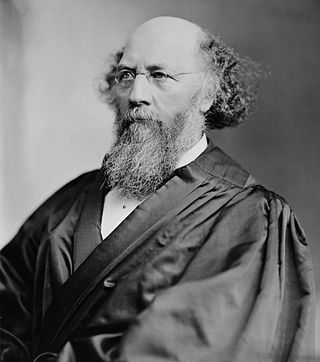Corporate personhood or juridical personality is the legal notion that a juridical person such as a corporation, separately from its associated human beings, has at least some of the legal rights and responsibilities enjoyed by natural persons. In most countries, a corporation has the same rights as a natural person to hold property, enter into contracts, and to sue or be sued.
Santa Clara County v. Southern Pacific Railroad Company, 118 U.S. 394 (1886), is a corporate law case of the United States Supreme Court concerning taxation of railroad properties. The case is most notable for a headnote stating that the Equal Protection Clause of the Fourteenth Amendment grants constitutional protections to corporations.

Stephen Johnson Field was an American jurist. He was an Associate Justice of the United States Supreme Court from May 20, 1863, to December 1, 1897, the second longest tenure of any justice. Prior to this appointment, he was the fifth Chief Justice of California.

The reporter of decisions of the Supreme Court of the United States is the official charged with editing and publishing the opinions of the Supreme Court of the United States, both when announced and when they are published in permanent bound volumes of the United States Reports. The reporter is responsible for only the contents of the United States Reports issued by the Government Publishing Office, first in preliminary prints and later in the final bound volumes. The reporter is not responsible for the editorial content of unofficial reports of the court's decisions, such as the privately published Supreme Court Reporter and Lawyers' Edition.

Law reports or reporters are series of books that contain judicial opinions from a selection of case law decided by courts. When a particular judicial opinion is referenced, the law report series in which the opinion is printed will determine the case citation format.
The United States Patents Quarterly (U.S.P.Q.) is a United States legal reporter published by the Bloomberg Industry Group in Washington, D.C. The U.S.P.Q. covers intellectual property cases including patents, copyrights, trademarks, and trade secrets, from 1913 to the present. The publisher stopped the sequence of volume numbers and restarted with a second series, cited as U.S.P.Q. 2d (BNA), in 1987.

The United States Reports are the official record of the Supreme Court of the United States. They include rulings, orders, case tables, in alphabetical order both by the name of the petitioner and by the name of the respondent, and other proceedings. United States Reports, once printed and bound, are the final version of court opinions and cannot be changed.

West is a business owned by Thomson Reuters that publishes legal, business, and regulatory information in print, and on electronic services such as Westlaw. Since the late 19th century, West has been one of the most prominent publishers of legal materials in the United States. Its headquarters is in Eagan, Minnesota; it also had an office in Rochester, New York, until it closed in 2019, and it had an office in Cleveland, Ohio, until it closed in 2010. Organizationally, West is part of the global legal division of Thomson Reuters.
West's National Reporter System (NRS) is a set of case law reporters for federal courts and appellate state courts in the United States. It started with the North Western Reporter in 1879 which has its origin in The Syllabi.

The Federal Reporter is a case law reporter in the United States that is published by West Publishing and a part of the National Reporter System. It begins with cases decided in 1880; pre-1880 cases were later retroactively compiled by West Publishing into a separate reporter, Federal Cases. The fourth and current Federal Reporter series publishes decisions of the United States courts of appeals and the United States Court of Federal Claims; prior series had varying scopes that covered decisions of other federal courts as well. Though the Federal Reporter is an unofficial reporter and West is a private company that does not have a legal monopoly over the court opinions it publishes, it has so dominated the industry in the United States that legal professionals, including judges, uniformly cite to the Federal Reporter for included decisions. Approximately 30 new volumes are published each year.

The Federal Appendix was a case law reporter published by West Publishing from 2001 to 2021. It collected judicial opinions of the United States courts of appeals that were not expressly selected or designated for publication. Such "unpublished" cases are ostensibly without value as precedent. However, the Supreme Court made a change to the Federal Rules of Appellate Procedure in 2006. Now, Rule 32.1 says that federal circuit courts are not allowed to prohibit the citation of unpublished opinions issued on or after January 1, 2007. Nevertheless, principles articulated in an opinion designated as "not for publication" are treated by the judges of that circuit as not necessarily binding on future panels hearing similar cases, nor on the district judges within the circuit.

The Federal Supplement is a case law reporter published by West Publishing in the United States that includes select opinions of the United States district courts since 1932, and is part of the National Reporter System. Although the Federal Supplement is an unofficial reporter and West is a private company that does not have a legal monopoly over the court opinions it publishes, it has so dominated the industry in the U.S. that legal professionals uniformly cite the Federal Supplement for included decisions. Approximately 40 new volumes are published per year.
Silverthorne Lumber Co. v. United States, 251 U.S. 385 (1920), was a U.S. Supreme Court decision in which Silverthorne had attempted to evade paying taxes. Federal agents illegally seized tax books from Silverthorne and created copies of the records. The ruling, delivered by Oliver Wendell Holmes Jr., was that any evidence obtained, even indirectly, from an illegal search was inadmissible in court. He reasoned that otherwise, police would have an incentive to circumvent the Fourth Amendment to obtain derivatives of the illegally obtained evidence. This precedent later became known as the "fruit of the poisonous tree doctrine," and is an extension of the exclusionary rule.

Henry Billings Brown was an American jurist who served as an associate justice of the Supreme Court of the United States from 1891 to 1906.
United States v. Detroit Timber & Lumber Company, 200 U.S. 321 (1906), is a decision of the Supreme Court of the United States. Although the primary issue to the parties of the case was to determine ownership of 44 tracts of timberland, the case has become the standard reference to warn attorneys not to rely on the syllabus of a reported case.

Federal Cases, circuit and district courts, 1789–1880 was a reporter of cases decided by the United States district and circuit courts between 1789 and 1880. It is part of the National Reporter System.
South-Central Timber Development v. Wunnicke, 467 U.S. 82 (1984), was a United States Supreme Court case in which the Court held unconstitutional Alaska's inclusion of a requirement that purchasers of state-owned timber process it within state before it was shipped out of state. According to a plurality opinion by Justice White, Alaska could not impose "downstream" conditions in the timber-processing market as a result of its ownership of the timber itself. The opinion summarized "[the] limit of the market-participant doctrine" as "allowing a State to impose burdens on commerce within the market in which it is a participant, but [to] go no further. The State may not impose conditions [that] have a substantial regulatory effect outside of that particular market."
The United States Supreme Court Reports, Lawyers' Edition, or Lawyers' Edition, is an unofficial reporter of Supreme Court of the United States opinions. The Lawyers' Edition was established by the Lawyers Cooperative Publishing Company of Rochester, New York in 1882, and features coverage of Supreme Court decisions going back to 1790. The first Lawyers' Edition series corresponds to the official United States Reports from volume 1 to volume 351, whereas the second series contains cases starting from the official reporter volume 352. It is currently published by LexisNexis.
United States v. Cook, 86 U.S. 591 (1873), was a United States Supreme Court case in which the Court held that Indian tribes do not own the land their reservations are on, the land is owned by the United States and the Indians only have a right to occupy the land. They may not cut and sell timber merely for the purpose of selling timber, they may only sell timber that was cut incidental to another purpose. The government has a right to take action to recover damages for timber sold illegally from that land.








